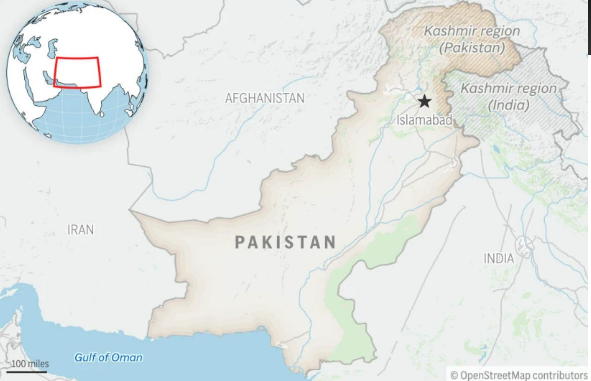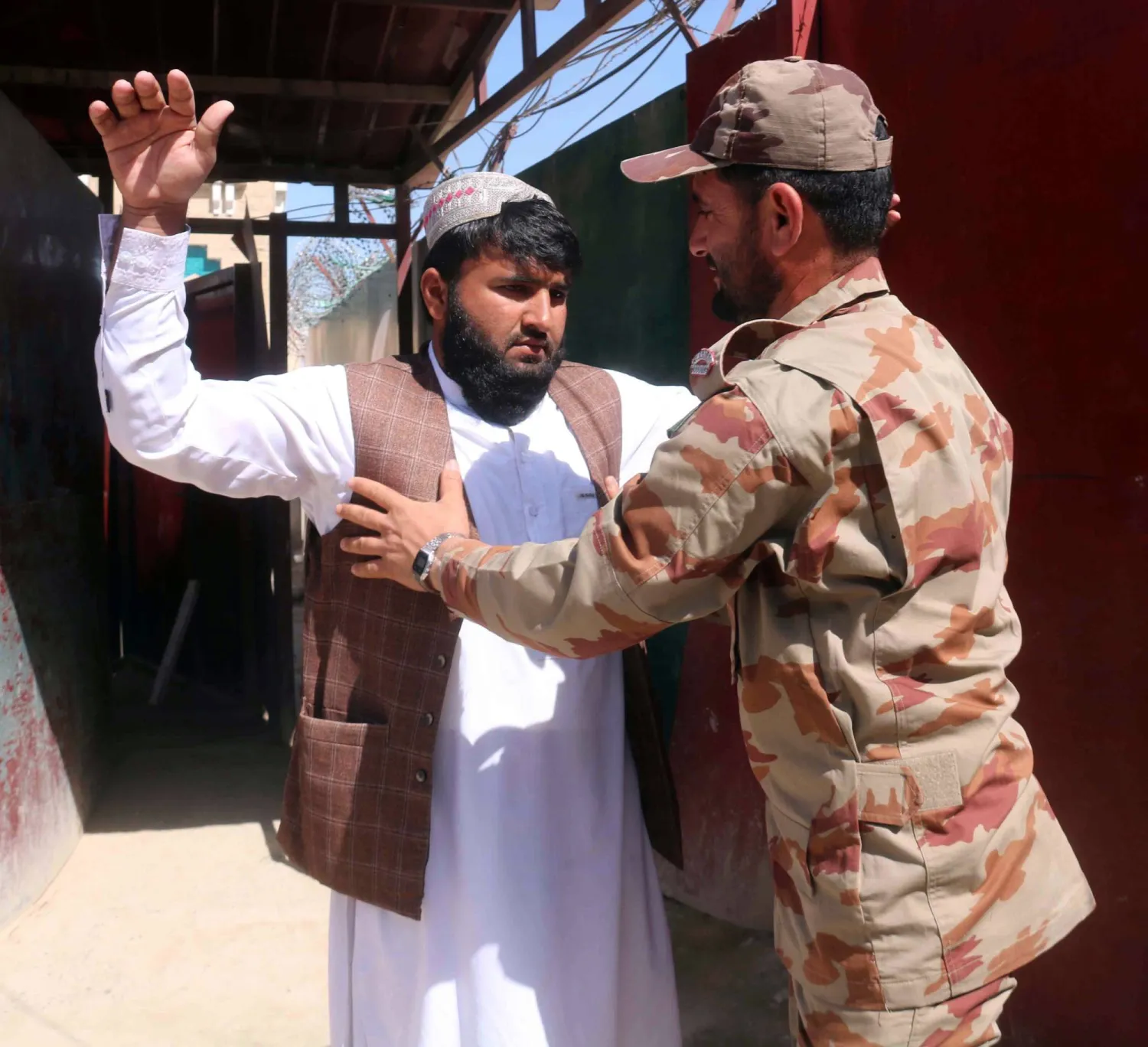
This is a locator map for Pakistan with its capital, Islamabad, and the Kashmir region. (AP Photo)
Published October 26, 2025
A powerful roadside bomb struck a police vehicle in Hangu, Khyber Pakhtunkhwa province, northwest Pakistan, on Friday, October 24, 2025, killing three police officers—a city police chief and two junior officers. The officers were en route to a police station that had been attacked less than an hour earlier. Interior Minister Mohsin Naqvi condemned the attacks and attributed them to the Pakistani Taliban, a group allied with Afghanistan’s Taliban. Pakistan accuses Kabul of harboring militants responsible for cross-border attacks, a charge Kabul denies.
On the same day, Pakistani security forces raided a militant hideout in Tank district and killed eight Pakistani Taliban militants. The violence occurred just before scheduled peace talks between Pakistan and Afghanistan in Istanbul, following an initial round in Doha. The discussions, brokered by Qatar and Turkey, aim to end cross-border violence and implement a verifiable monitoring mechanism.
Elsewhere in Pakistan, in the southwestern Balochistan province, insurgents kidnapped 13 construction workers … Khuzdar district, highlighting the broader security challenges in the country.
 Implications
Implications
1. Security and Counterterrorism
-
Persistent Threat from Militants: The attack demonstrates the continued operational capabilities of the Pakistani Taliban in northwest Pakistan, signaling that previous counterterrorism measures are insufficient.
-
Strain on Law Enforcement: Police and military forces may be forced to divert resources from regular duties to address immediate security threats, potentially weakening overall public safety in the region.
-
Risk of Retaliation: The Pakistani Taliban and affiliated groups may launch additional attacks in response to raids and countermeasures, creating a cycle of violence.
2. Political Implications
-
Government Accountability: The bombing amplifies pressure on Pakistan’s federal and provincial governments to demonstrate effectiveness in protecting law enforcement and civilians.
-
Peace Talks Under Threat: Scheduled talks with Afghanistan may face setbacks as Pakistan insists on concrete commitments from the Afghan Taliban to prevent cross-border attacks. Failure could weaken diplomatic credibility.
-
Domestic Political Tension: Political parties may leverage the attack to criticize government policies, creating potential internal divisions and debates over security strategy.
3. Regional Stability
-
Pakistan-Afghanistan Relations: Accusations from both sides about harboring militants heighten diplomatic friction and risk escalating tensions along the shared border.
-
Cross-Border Violence: Continued attacks may spill over into other border areas, threatening broader regional security and complicating international mediation efforts.
4. Social and Economic Implications
-
Public Anxiety: The local population may experience heightened fear and insecurity, affecting daily life, mobility, and confidence in law enforcement.
-
Impact on Development Projects: Infrastructure and development initiatives may be delayed or disrupted due to security concerns, particularly in conflict-prone regions like Balochistan and Khyber Pakhtunkhwa.
-
Potential Migration or Displacement: Repeated attacks could prompt local residents to relocate to safer areas, creating secondary social and economic pressures.
5. International and Strategic Implications
-
Global Attention on Pakistan: Continued insurgent activity may attract international scrutiny, especially from countries involved in peace brokering (e.g., Qatar, Turkey, UN).
-
Strategic Calculations: Neighboring countries and regional powers may reassess security and border policies in response to Pakistan’s domestic instability, influencing diplomatic and military strategies.
 Overall Takeaway:
Overall Takeaway:
The October 24, 2025, roadside bombing in Hangu, Khyber Pakhtunkhwa, which killed three police officers, underscores the ongoing security challenges Pakistan faces in its northwest regions. The attack, linked to the Pakistani Taliban, highlights persistent threats from militant groups operating along the Pakistan-Afghanistan border.
Sustained counterterrorism operations, enhanced border security, and effective regional cooperation will be crucial in stabilizing the situation and preventing further escalation. The country’s response in the coming months will play a decisive role in shaping both domestic security and broader regional stability.
SOURCES: AP NEWS – Roadside bombing kills 3 police officers in northwest Pakistan
US NEWS – Roadside Bombing Kills 3 Police Officers in Northwest Pakistan
SEYMOUR TRIBUNE – Roadside Bombing Kills 3 Police Officers in Northwest Pakistan









Be the first to comment